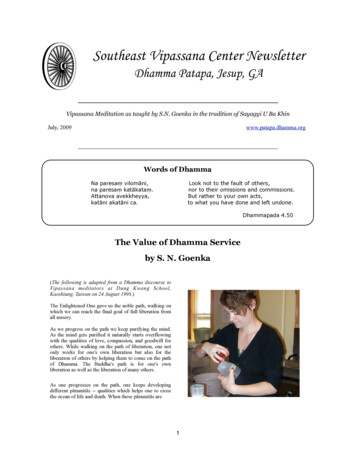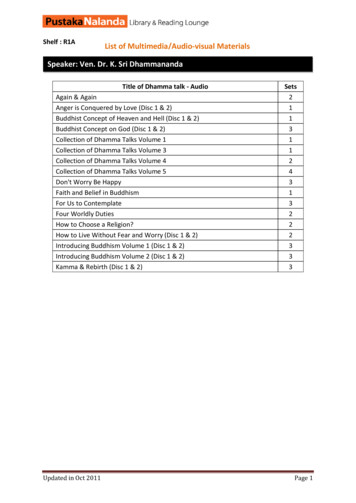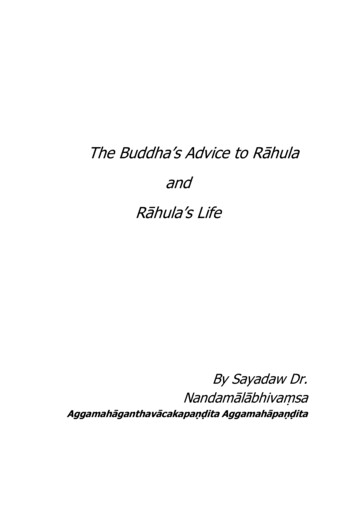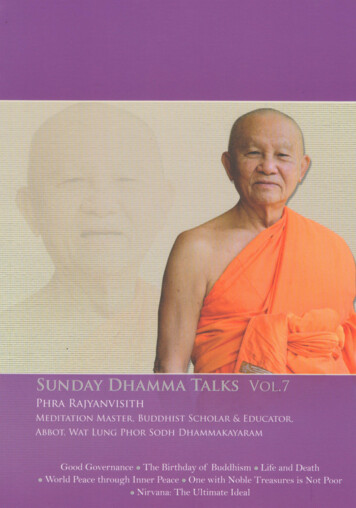
Transcription
Southeast Vipassana Center NewsletterDhamma Patapa, Jesup, GAVipassana Meditation as taught by S.N. Goenka in the tradition of Sayagyi U Ba KhinJuly, 2009www.patapa.dhamma.orgWords of DhammaNa paresaṃ vilomāni,na paresaṃ katākataṃ.Attanova avekkheyya,katāni akatāni ca.Look not to the fault of others,nor to their omissions and commissions.But rather to your own acts,to what you have done and left undone.Dhammapada 4.50The Value of Dhamma Serviceby S. N. Goenka(The following is adapted from a Dhamma discourse toVipassana meditators at Dung Kwang School,Kaoshiung, Taiwan on 24 August 1998.)The Enlightened One gave us the noble path, walking onwhich we can reach the final goal of full liberation fromall misery.As we progress on the path we keep purifying the mind.As the mind gets purified it naturally starts overflowingwith the qualities of love, compassion, and goodwill forothers. While walking on the path of liberation, one notonly works for one's own liberation but also for theliberation of others by helping them to come on the pathof Dhamma. The Buddha's path is for one's ownliberation as well as the liberation of many others.As one progresses on the path, one keeps developingdifferent pāramitās -- qualities which helps one to crossthe ocean of life and death. When these pāramitās are1
(Service .)One has to take training for a long time to reach the stagewhere one can teach Dhamma and give dāna of Dhamma.Everyone may not reach the stage where one can givedhammadāna. But everyone can certainly give Dhammaservice which is a part of the dhammadāna given by theteacher. This dāna of Dhamma service will also give the fruitof Dhamma for this person in future. Not only that but bygiving Dhamma service in a course, one startsunderstanding: "I received Dhamma because somebody gaveservice in the course. If I do not give Dhamma service inreturn, I am becoming more selfish, I am working only formyself."fulfilled, it becomes easy to reach the final goal.Dāna is a very important pāramī. And, according to thewords of the Enlightened One, the dāna of Dhamma is thegreatest of all.Why is it the greatest? Let us understand.According to the law of nature, the seed that we sow willgive fruits, many fruits and each fruits will contain the sametype of seed. If we give dāna of food, then the fruit will bethat we will get sufficient food in our present life and futurelives.One starts understanding the real teaching of Buddha, whichis not only for one's self-liberation but also for the liberationof many others.Before being appointed as an assistant teacher, before beingappointed as a full-fledged teacher by my teacher, I had beengiving such service in Dhamma courses for fourteen years.So from my own personal experience, I can say that givingDhamma service, serving people in a Dhamma course, givesso much strength in Dhamma to oneself.This is not my experience alone. I come across manystudents who come and report to me, "By giving service in aten-day Dhamma course my meditation has becomestronger."Like the teacher, the Dhamma worker also gets so much joyin serving people in Dhamma. When a course starts, there isso much melancholy on the faces of the people who havejoined. Everyone has some misery or the other in his day-today life. But after ten days, on the closing day of the course,the face of every meditator starts glowing; everyone isAccording to the same law of nature, whatever type of dānayou give, you will get that type of fruit in the future in agreater quantity. When you give the dāna of Dhamma, thefruit that you will get is a greater quantity of Dhamma.As a result, one becomes stronger and stronger in Dhammawhich helps one to reach the final goal. That is why theEnlightened One said that, "The dāna of Dhamma is thegreatest dāna."Dāna of Dhamma does not mean that only the teachinggiven by the teacher is the dāna of Dhamma. Of course, thisis a major part of the dhammadāna. But this dhammadāna ofthe teacher cannot be accomplished unless other things areavailable.Because the dhammadāna is given in a residential course, asuitable facility is also a part of the dhammadāna. Even if afacility is available and if there is nobody to manage thecourse, then this dhammadāna cannot be accomplished.Even if a manager is available, this dāna cannot be fullyaccomplished unless there are Dhamma workers to help themanager.So the facility to give the dhammadāna with food and otherrequirements, proper management, and the Dhammaworkers -- they all join together to give real dhammadāna.Those who manage the course and those who give service inthe course are partners in the dhammadāna of the teacher.smiling and there is so much happiness on the faces of themeditators.2
(Goenka . )Seeing this big change in the people who have participatedin the course, not only the teacher but also the Dhammaworkers are filled with joy. This joy cannot be comparedwith any kind of sensual pleasure. This joy is pure joy -- fullof Dhamma, full of mettā, full of karuṇā, love, compassion.want to apply Dhamma in your day-to-day life, give someservice in Dhamma courses and get proper training."By giving Dhamma service in a course, you are fulfilling theteaching of the Buddha which is not just to help yourself toget liberated but also to help others to get liberated.There is another reason why Vipassana meditators shouldgive service as Dhamma workers. When you take Vipassanacourses, you try to change the habit of your mind. Instead ofreacting to situations, you learn how to remain equanimousin different situations. While in the course, you are trainingyour mind to remain equanimous with the help of thesensations. That is the root level of the mind.Therefore, I keep recommending to my students, "As youfind time of ten days for purifying your mind for your owndevelopment in Dhamma, you must also give at least tendays in a year to serve others so that both the aspects ofBuddha's teaching become stronger in you."I want all of you to keep growing in Dhamma, not just totake courses and then to forget about it. You have to applyDhamma in life. And to apply it in life, serve at least onecourse a year to get the strength to apply it in life.But it cannot be said that one has really become equanimousjust by taking course after course. One becomes perfect inDhamma only when one starts applying this equanimity inthe day-to-day life in the outside world. And if a student isnot very ripened in Dhamma, is quite raw in Dhamma, itbecomes so difficult to apply this equanimity in day-to-daylife.May you all keep growing in Dhamma -- not only for yourgood and benefit, not only for your liberation, but also forthe good and benefit of so many others, for the liberation ofso many others.One gets a very good training-ground to develop equanimitywhen one comes to give service in a Dhamma course. In acourse, a Dhamma worker has to face many kinds ofmeditators, many kinds of situations. Some meditators maybe very short-tempered. Some of them may have a lot ofnegativities. While serving in the course, one learns how todeal with such people who are short-tempered or who have alot of negativities. In the atmosphere of the Dhamma course,there is not so much negativity as you find in the outsideworld. A short-tempered student of meditation might have alot of negativity in his or her mind, but will not express it asstrongly as in the outside world.Bhavatu sabba maṇgalaṃ!May all beings be happy!Still, some negativity is shown by short-tempered studentscoming to the course. The worker learns how to deal withthese people. He learns it very easily because the entireatmosphere is a Dhamma atmosphere. In this Dhammaatmosphere it becomes easy for the Dhamma worker tomaintain equanimity, in spite of all the provocation, in spiteof all the negativities being exhibited by a student.A Dhamma worker is not giving service all the time while inthe course. Whenever service is needed, one gives service.The rest of the time, one gets the opportunity to meditate. Sosometimes even if a Dhamma worker generates irritation,having come across some negativity of the student, hewashes it out by meditating and starts generating love andcompassion again.This is how a Dhamma worker gets a training-ground, whereone can easily train oneself to face the negativities of otherpeople and to generate nothing but love and compassion forthem. So by giving Dhamma service in a course, it becomeseasy for this person to face the world outside, which is fullof negativities, full of vicissitudes, full of ups and downs.Therefore I keep encouraging my students of Dhamma, "Ifyou really want to get established in Dhamma, if you really3
without breaks, and yet continued working togetherharmoniously and happily for the duration of the course. Iwas continually surprised that I could work at this level ofintensity, almost continuously through many courses, andstill keep up the energy and enthusiasm necessary for thejob. I realized that it was not attributable to any outstandingqualities of my own, but to the practice itself. The fact that Iwas doing something, every moment of the day, which I feltwas worthwhile and of service to others kept me going. Thisfeeling, arising out of and developed through the regulardaily sittings of Vipassana, buoyed me up and carried meforward beyond what I had thought were the limits of mycapabilities. “Capacity to work increases” indeed!Dhamma ServiceThe Southeast Vipassana Dhamma Service Committee hasgone through a major shift since the opening of DhammaPatapa. Due to continual courses, some with only a threeday interval, servers are needed on an ongoing basis.Having at least two long-term servers at the Center seems tobe a critical factor in keeping the center functioningproperly. The Dhamma Service Committee has beenreaching out to the Old Student base in the Southeast to letthem know about the increasing Dhamma serviceopportunities.I highly recommend that any student of Vipassana availthemselves of this highly beneficial experience. Myexperience has shown me that helping others to discover anddevelop this practice is of the highest value in developingone's own practice.The following account, from an Old Student who served atthe Center during the summer of 2007, is one person'sexperience of the benefits of service.Dhamma WorksWhen you work for Dhamma, Dhamma works for you.Long Term ServerOpportunities atDhamma PatapaBefore coming to the new Southeast Vipassana Center(Dhamma Patapa) for the summer, I felt a little trepidation.South Georgia in the hottest months of the year! Havinglived in Atlanta for years, I knew how hot it could get, andafter spending last summer in British Columbia, the prospectof 99 degree/99% humidity heat and swarms of mosquitoesfeasting on my sweet blood was a bit daunting. However,something was drawing me there; I felt compelled to go. Iwas also looking forward to contributing to the growth ofour new Center and helping in the spread of Dhamma. Irealized that my personal concerns had to be secondary.Long-term Dhamma Servers are needed at Dhamma Patapafor committed periods ranging from one month up to a year.Currently the Center can accommodate two long-termservers in private rooms. Construction is almost completeon private accommodations for four more servers. Thecabins are scheduled to be completed by May 2009. Atpresent, more Long-Term Dhamma Servers can stay in theserver dormitories during the courses and in their own roomin between the courses. In addition to our Center Manager,we now have two male long-term servers. Long-termservice provides a consistency that helps the Center runsmoothly and efficiently. It also gives Old Students theopportunity to deepen and strengthen their practice throughhelping others.On arriving I found the center to be functioning quite well,in a fast and loose kind of way, and a feeling arose thatcontinued to grow throughout the summer: that thoughgeographically we are in the South, spiritually we're in theWild West - out on the Dhamma frontier! At night, walkingback from the Dhamma hall, with the moon and stars brightoverhead and the small footlights glowing around the Centerand the lotus pond, it often felt as if we were in a small fortor enclave, removed from the toxicity of the world andproviding a temporary respite for the people passingthrough. Surprisingly, the things I feared most turned out tobe negligible. The summer was the mildest I have everexperienced in Georgia, and even though the large pond iscentrally located, the mosquitoes were minimal.Who is eligible to give Long Term Dhamma Service?Any Old Student seriously interested in a deeper practiceand being of service to others may apply to give Long TermDhamma Service. An interview with an assistant teachermay be required.How long can an Old Student stay at the Center?Service of one month or longer is considered long-term, andmay extend for a year or more. The length of time isdetermined by an initial interview between the student andan assistant teacher and/or the Center Manager. Since thereis no actual contract between the student and the center, thestudent or management may shorten or lengthen their stay atany time.The biggest difficulty turned out to be a shortage of servers:we almost always operated with a skeleton crew. Being anew Center, there were areas where we were falling short,but as each course drew to a close and we watched studentsinteract on Metta day, it was evident that something specialwas happening. Group after group of students were elated,reporting wonderful and highly beneficial experiences.Often, entire groups enthusiastically expressed gratitude forthe Center and thanks to those who had served them.What is the sitting schedule for a Long Term Server?The main focus is to serve the Center. However, servers sitthe three daily group sittings and may sit more during theirIt was very inspiring for me to be part of these small groupsof servers who worked so hard, often for long periods4
(Service opportunities . )free time. As part of their stay at the Center, Long Term Dhamma Servers are encouraged to sit a course periodically. Dependingon the individual, this means that s/he will usually be able to sit a course about every two to three months. This is scheduled withan Assistant Teacher and/or Center Manager.Do Long Term Dhamma Servers follow the same guidelines as a regular course server?Yes, all servers must follow the guidelines in the Code of Conduct for Dhamma Workers. This is especially important for LongTerm Dhamma Servers, as they will have more responsibility and be an example to other servers.Do Long Term Dhamma Servers get time off from the Center?It is important for someone staying longer at the Center to have down time and days off to occasionally tend to personal businessand simply relax off the Center grounds. If one is involved directly with serving on courses, then days off are scheduled betweencourses. If the Long Term Dhamma Server is a member of a committee and not involved directly as a course server, then time offcan be more flexible, depending on his/her responsibilities.What are the accommodations for a Long Term Dhamma Server?Two private rooms are available in the construction trailer just outside the course boundaries on the Center property.Construction is almost complete on two buildings for Long Term Server accommodations outside the course boundary which willhouse two females and two males.Opportunities for Dhamma ServiceThere are many ways an Old Student can give Dhamma service: Serving on a 10-day course full timeServing on a 10-day course part timeServing as a long-term server staying at the Center from 1-12 monthsJoining a SE Vipassana Committee, such as the Dhamma Service Committee, the Household Committee, orthe Kitchen CommitteeParticipating in the phone tree (calling around to Old Students who want to be informed of serviceopportunities when servers are needed)Adopting a job (see list below)Serving in between courses to accept food orders and clean the Center for the next courseServing on Day 0 or Day 10 & 11 (at the Registration table, in the kitchen, or at the dana table)Serve at a work period or Trust retreat weekendAdopt-a-Job List: Organize scrap wood pilesSew meditation cushions and cushion coversOrganize and replenish student suppliesClean building exteriorsClear brush from woods areasRelocate selected treesDeep clean buildingsPlant shrubs and flowersPLEASE CONTACTinfo@patapa.dhamma.orgOR CALL 912-588-9807IF YOU ARE INTERESTEDIN DHAMMA SERVICE5
Finance ReportFor more details, please feel free to contact the finance committee at:finance-committee@patapa.dhamma.org.Income ReportExpense ReportDecember 2008Year‐to‐DateDecember 2008Year‐to‐DateCategoryTotalDanaDana for CenterDana-In-KindInterest Earned13,664.35193,709.70179.09357.03Total Income207,910.17CategoryTotalAdministrative CostsConstruction CostsCourse Cost66,186.77113,289.0768,665.23Total Expenses248,141.07Net-40,230.90Wish ListDhamma books from Pariyatti (call the center to find out specific titles, 912-588-9807)Book shelvesOffice desk (47 inches wide max)Filing cabinet (three or four drawer) with locking drawersColor printer (good working condition)Two (2) upright vacuum cleaners (Hoover, or another quality brand, in good working conditionIpod or similar Mp3 player: 6 - 10 Ipod shufflesKitchen needs: Set of quality kitchen knives, cooking wok, black pepper mill,two (2) rice cookers (without teflon coating)Gardening tools: pruning shears (hand), metal fan rakes, hand shovelsPlants & trees: Crape Myrtle, Weeping Willows, Cypress, ferns, Eucalyptus, Magnolia, Palm trees, Peach trees, Pecantrees, Dogwood trees, blueberry bushes, raspberry bushes, blackberry bushesHerbs: mint, dill, sage, oregano, basil, cilantro, parsley, fennel, lavender, rosemary, thymeFlowers: sunflowers, wild flower seeds, gardenias, honeysuckle, azaleas, spider lilies, lilies, lantana "new gold", lamb'sear, Queen Anne's lace, Confederate Jasmine, wisteria6
First Children's Courseat Dhamma PatapaDhamma PatapaBeautification ProjectOn July 29 & 30, 2008, eight children from the ages of 8 to12 came to Dhamma Patapa for the first two-day Children'sAnapana Meditation Course held in the Southeast. After ashort orientation and snack, the children came quietly intothe meditation hall to learn Anapana.Now that Dhamma Patapa has successfully completed one yearof courses, the time has come to focus on landscaping to makeour center more beautiful. We are presently looking for: The meditation sessions were interspersed with physical andcreative activities such as painting, nature walks, journalmaking, drawing, and writing. Groupleaders served as companions and guidesfor the children throughout the day,helping with crafts and leading theactivities. an old student to coordinate the Landscape/Maintenance Committeean old student Landscape Architect who could createa long term plan for the centerLandscape/Maintenance Committee membersEfforts are now being made to start theBeautification Project. If you wish to donatea plant, shrub, or tree please contact the center(912-588-9807 ormanager@patapa.dhamma.org) to find outwhat types are needed.This course was a great success: All ofthe children who attended expressed aninterest to come back for another course!May the seeds of Dhamma continue tosprout in young people around theworld.You can also stop by Moody's Nursery inJesup, GA on your way to the center and pickup some flowers, herbs, or trees. We willhave a list of desired items kept there. Justask for Terri. You can just tell her the priceyou would like to spend and she will help you.There will be children's and teen coursesin the summer of 2009 on the followingdates.Moody's Nursery: 3170 S. US Hwy 301,Jesup, GA, 31546; Phone number:912-427-4183Children's CourseJune 27-28, 2009Teen Course - Male OnlyJuly 18-19, 2009Teen Course - Female OnlyAugust 8-9, 2009Coming from the south on US 301, pass E. Broadhurst Rd andtravel to Airport Rd. Moody's is on the left across from AirportRd. From the north on US 301, Moody's is a few miles out oftown on the right across from Airport Rd., before you get to E.Broadhurst Rd.Old students are also encouraged to bring plants or clippingsfrom their yards.7
Teenagers' & Children's Courses2009 Course ScheduleDatesCourseTypeStatusJun 27 - 28Children's Course Girls — OpenBoys — OpenPlease visit ourchildren's course pagefor information/applicationJul 18 - 19Teen Course(Male Only)Please visit ourteens' course pagefor more information/application.Boys — OpenCommentsOld Student Servers Needed?YesYesTen Day & Other Adult Courses2009 Course ScheduleDatesCourseTypeJul 1 - 1210-DayWomen — Long Wait ListMen — Short Wait ListYesWomen —Long Wait ListMen — Short Wait ListYesJul 22 - Aug 2 10-Day BilingualEnglish/HindiStatusCommentsOld Student Servers Needed?Aug 12 - 2310-Day BilingualWomen — Short Wait ListEnglish/Vietnamese Men — OpenYesSep 2 - 1310-DayYesWomen — OpenMen — OpenSep 23 - Oct 2 Satipatthana SuttaWomen — OpenMen — OpenFor Old Studentswho meet requirementsYesOct 2 - 4Trust RetreatWomen — OpenMen — OpenFor all Old StudentsYesOct 9 - 133-Day OSCWomen — OpenMen — OpenFor Old StudentsYesOct 14 - 2510-DayWomen — OpenMen — OpenYes8
Ten Day & Other Adult Courses (cont’d)2009 Course ScheduleDatesCourseTypeOct 14 - 2510-DayWomen — OpenMen — OpenYesNov 4 - 1510-DayWomen — OpenMen — OpenYesNov 25 - Dec 6 10-DayWomen — OpenMen — OpenYesDec 26, 2009- Jan 6, 2010WomenMen10-DayStatusCommentsOld Student Servers Needed?RegistrationNot Yet OpenApplications acceptedAfter Sept. 1, 2009This course will be held at :Fort Yargo State Park - Winder, GA.Private Accommodationsfor Long TermDhamma ServersVipassana centers have learned that long-termservers, who provide operational continuity andexperience, are key to conducting courses in a calmand efficient manner. Attracting and keeping longterm servers is easier when they are provided withpleasant, quiet, and private quarters away fromcourse activities.The Southeast Vipassana Association decided thatthe next expansion priority should be theconstruction of such accommodations for long-termservers.Construction began in February on a pair of cabins,one for men, the other for women, in a wooded areanot far from the current kitchen and dining facility.Our design aim has been to balance cost and9
(Accommodations .)comfort, while matching the existing architecturalfeatures of existing Dhamma Patapa structures. Eachcabin will house two servers in private bedrooms with ashared bathroom.The bedrooms will be "cozy", but large enough for abed, dresser, desk and some open floor space.Servers will be able to prepare simple meals in a smallarea in the cabin entrance way, which will contain apantry closet housing a mini-refrigerator, microwave,toaster, hot plate, countertop, shelves, and utensils.Dhamma Patapa Annual MeetingPlease join the Southeast Vipassana Trust for our annual meeting at Dhamma Patapa Oct. 2 - 4, 2009. This is anopportunity for serious old students to learn about Vipassana in the Southeastern United States, get inspiredtogether, meditate together, and participate with the Trust in planning and establishing goals for 2010. This is onlyopen to old students. Please confirm by contacting danieltdodd@gmail.com.10
www.patapa.dhamma.org11
The Southeast Vipassana Dhamma Service Committee has gone through a major shift since the opening of Dhamma Patapa. Due to continual courses, some with only a three day interval, servers are needed on an ongoing basis. Having at least two long-term servers at the Center seems to










